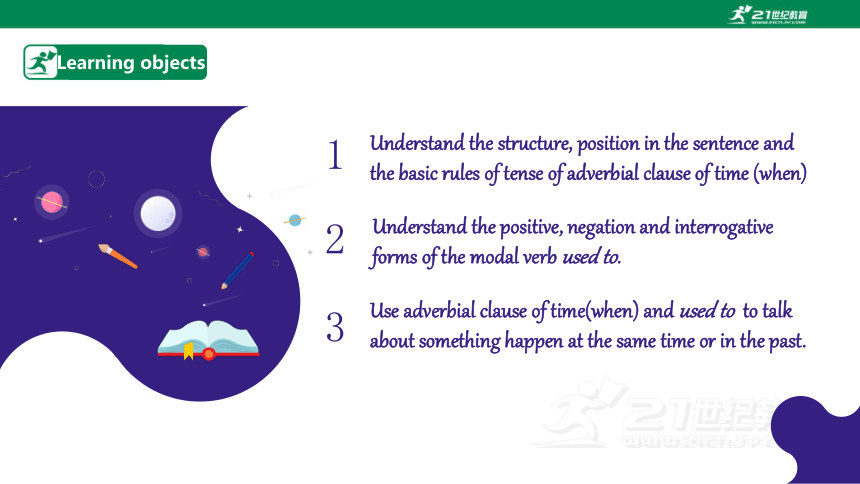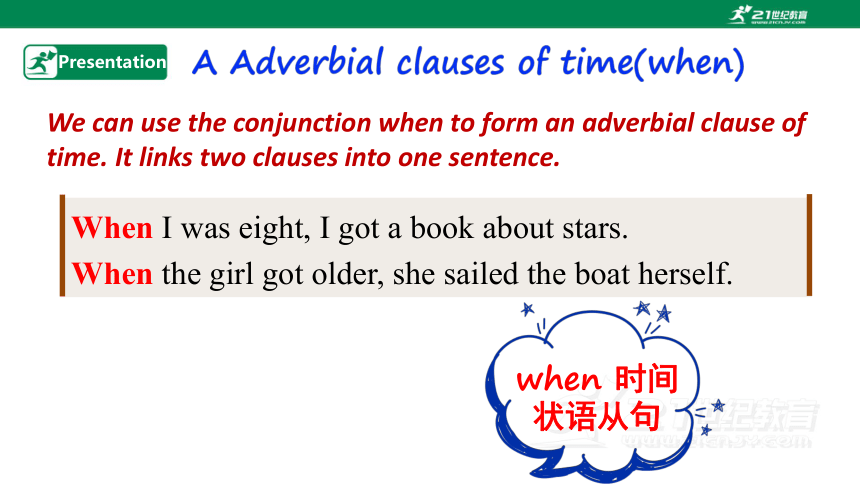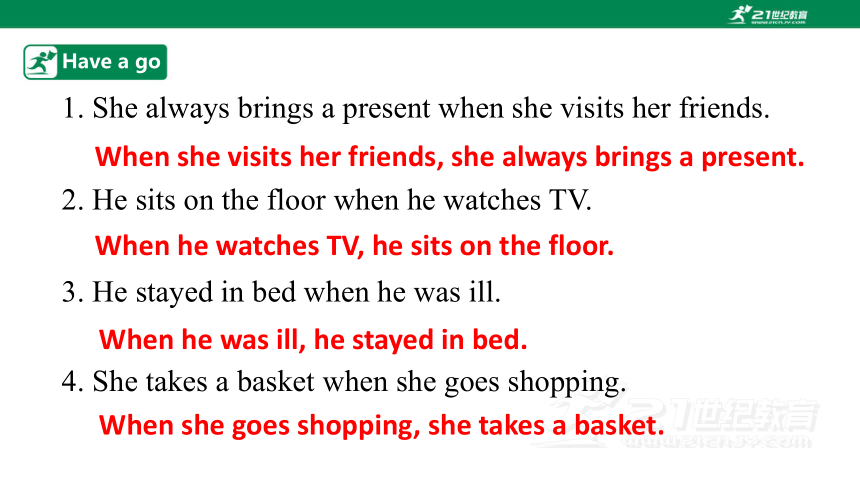【新课标】Unit 8 From hobby to career 第3课时Grammar课件
文档属性
| 名称 | 【新课标】Unit 8 From hobby to career 第3课时Grammar课件 |

|
|
| 格式 | pptx | ||
| 文件大小 | 11.5MB | ||
| 资源类型 | 试卷 | ||
| 版本资源 | 牛津深圳版 | ||
| 科目 | 英语 | ||
| 更新时间 | 2023-05-19 00:00:00 | ||
图片预览












文档简介
(共37张PPT)
Unit 8 From hobby to career
Period 3 Grammar
牛津深圳·广州版 七年级下
Learning objects
1
Understand the structure, position in the sentence and the basic rules of tense of adverbial clause of time (when)
2
Understand the positive, negation and interrogative forms of the modal verb used to.
3
Use adverbial clause of time(when) and used to to talk about something happen at the same time or in the past.
Guessing
game
Tom was crying. What did he do to become happy again
Maybe he ...
Lead in
When Tom was sad, he ...to become happy again.
When Tom was sad, he played games with his friends to become happy again.
When Tom was sad, he watched TV to become happy again.
Lead in
When Tom was sad, he...to become happy again.
When Tom was sad, he played basketball with his friends to become happy again.
When Tom was sad, he listened to music to become happy again.
Lead in
When something happened in some specific time, we will use adverbial clauses of time.
When I was eight, I got a book about stars.
Lead in
Presentation
A Adverbial clauses of time(when)
We can use the conjunction when to form an adverbial clause of time. It links two clauses into one sentence.
when 时间状语从句
When I was eight, I got a book about stars.
When the girl got older, she sailed the boat herself.
Presentation
Work out the rule
When we use the conjunction when to link two clauses, we tell people that the two actions happen at _________ time.
the same
当由when引导的时间状语从句位于主句之前时,句中要加逗号。
When we arrived, the sky went dark.
The sky went dark when we arrived.
Adverbial clause of time
Main clause
Adverbial clause of time
Main clause
Presentation
I will tell him everything when he comes back.
Work out the rule
The verb in the when-clause is in _____________________. The verb in the main clause is in _____________________.
the simple future tense
Adverbial clause of time
Main clause
the simple present tense
主将从现
A B
1 She always brings a present 2 He sits on the floor 3 He stayed in bed 4 She takes a basket A. he was ill.
B. she goes shopping.
C. she visits her friends.
D. he watches TV.
when
Match the clauses in column A with those in column B to make complete sentences with when. Then rewrite each sentence with the adverbial clause at the beginning.
Have a go
1. She always brings a present when she visits her friends.
When she visits her friends, she always brings a present.
2. He sits on the floor when he watches TV.
When he watches TV, he sits on the floor.
Have a go
3. He stayed in bed when he was ill.
When he was ill, he stayed in bed.
4. She takes a basket when she goes shopping.
When she goes shopping, she takes a basket.
When时间状语从句
Summary
时间状语从句用于说明主句动作发生或进行的时间。
时间状语从句位于主句之前时,要用逗号将从句和主句隔开;位于主句之后时,则不需用逗号。
When时间状语从句
意义 表示从句的动作与主句的动作同时发生。
时态 当表示现在的时候,主句和从句同用现在时态;
当表示过去的时候,主句和从句同用过去时态;
当表示将来的时候,主句用一般将来时,从句用一般现在时表将来
Summary
When the bell rings, he gets into the classroom.
当铃声响起时,他进入教室。
When you were out, Jack called in.
你出去的时候,杰克来了。
I will tell her the news when I meet her.
当我见到她时,就会把这个消息告诉她。(从句用一般现在时表示将来发生的动作)
When时间状语从句
Summary
时间状语从句的引导词除了when 之外,常用的还有:
before 在……之前 after 在……之后
while 当……时 as soon as 一……就……
until 直到 since 自从
once 一旦 as 随着
When时间状语从句
Summary
I have breakfast at home before I go to school. 在我上学之前,我在家里吃早餐。
While my dad is reading, my mum is cooking. 我爸爸在看书时,我妈妈在做饭。
I fell asleep as soon as I lay in bed last night. 昨晚我一躺在床上就睡着了。
Once you learn to swim, you will like this sport. 一旦你学会游泳,你会喜欢这种运动。
As I grow older, my memory gets worse. 随着年岁的增长,我的记忆力变差了。
Summary
( )1. I was doing my homework alone in the classroom ____ I heard the song.
A. because B. when C. though D. after
( )2. He was at the table ____ someone knocked at
the door.
A. why B. where C. when D. what
( )3. ____ I was a child, I wanted to be a doctor.
A. When B. After C. Until D. Before
B
C
A
Exercise
一、单项选择。
( )4. Tom ____ into the house when no one was looking.
A. slipped B. was slipping
C. slip D. slips
( )5. I ____ him the book when he ____ back.
A. will give, will come B. give, comes
C. will give, comes D. give, will come
C
A
Exercise
我上学时总是看到这只狗。
When I go to school, I always see the dog. / I always see the dog when I go to school.
2. 昨天下雨时,汤姆待在家里。
When it rained yesterday, Tom stayed at home. / Tom stayed at home when it rained yesterday.
3. 当你取得进步时,我会给你买一份礼物。
When you make progress, I will buy you a present. / I will buy you a present when you make progress.
二、将下列句子翻译成英文。
Exercise
Yao Ming used to be short, but now he is very tall.
He didn’t use to play basketball well, but now he is one of the most popular basketball players.
Lead in
Read the sentences and understand the meaning of them.
In groups of four, make sentences with “used to” and “did not use to”, and then present those sentences to the class.
used to/did not use to
Meaning
Examples
Pay attention to
…
Lead in
I didn’t use to have much money.
I used to go outside with my mum on clear nights and look at the sky.
Presentation
B used to & did not use to
过去常做
When did he dad use to take them for trips on his boat
We use used to to talk about something we often did in the past. Its negative form is did not use to/ didn’t use to.
PAST
NOW
he used to work
he works
Dave used to work in a factory.
Now he works in a supermarket.
Dave used to work in a factory.
= Dave worked in a factory, but he doesn’t work there now.
Presentation
Presentation
Mike used to go to Dongfeng Road Primary School.
Now he goes to No.5 Junior High School.
Look at the pictures of Mike at primary school and Mike now. What did he use to do and what does he do now Use the example below to help you.
Have a go
Mike used to go to bed at 9 p.m.
Now he goes to bed at 10 p.m.
Have a go
Mike didn't use to enjoy swimming.
Now he goes swimming every week.
Have a go
Mike used to be shy.
Now he enjoys talking to people.
Have a go
used to do sth 过去常常做某事
表示过去经常发生的动作或存在的状态,而现在此动作已不再发生或此状态已不存在。
这个结构含有今昔对比之意。
其否定式为:did not / didn’t use to do sth
其疑问式为:did ... use to do sth
Summary
Used to do
I used to swim in this river when I was young. 我小时候常常在这条河里游泳。
They didn’t use to be good friends. 他们以前不是好朋友。
What did you use to do 你过去常常做什么?
Summary
Used to do
Past Now
Short hair Long hair
Short Tall
Careless Careful
Like running Like swimming
Sad Happy
Have a go
In pairs, use the information and follow the example to make a dialogue.
Did you use to have short hair
Yes. I used to have short hair. But now I have long hair.
Did you use to be tall
No. I didn’t use to be tall. But now I’m tall.
1. Rose used to watch TV a lot. (改为一般疑问句)
_____ Rose _____ _____ watch TV a lot
2. Peter used to draw pictures. (改为否定句)
Peter ______ _____ _____ draw pictures.
3. Eric used to be very fat. (就划线部分提问)
What _____ Eric _____ _____ be like
Did use to
didn’t use to
did use to
Exercise
一、根据题目要求,完成下列句子。
1. 他过去不常喝咖啡。
He ______ _____ _____ ______ coffee.
2. 我爸爸过去常常吸烟。
My father _____ _____ _______.
didn’t use to drink
used to smoke
Exercise
二、根据中文意思完成句子。
Homework
Finish Grammar exercise paper.
A vitality and broad interests can overcome all the unfortunate.
一个勃勃生机与广泛兴趣的人可以战胜一切不幸。
Reflection
谢谢
21世纪教育网(www.21cnjy.com)
中小学教育资源网站
兼职招聘:
https://www.21cnjy.com/recruitment/home/admin
Unit 8 From hobby to career
Period 3 Grammar
牛津深圳·广州版 七年级下
Learning objects
1
Understand the structure, position in the sentence and the basic rules of tense of adverbial clause of time (when)
2
Understand the positive, negation and interrogative forms of the modal verb used to.
3
Use adverbial clause of time(when) and used to to talk about something happen at the same time or in the past.
Guessing
game
Tom was crying. What did he do to become happy again
Maybe he ...
Lead in
When Tom was sad, he ...to become happy again.
When Tom was sad, he played games with his friends to become happy again.
When Tom was sad, he watched TV to become happy again.
Lead in
When Tom was sad, he...to become happy again.
When Tom was sad, he played basketball with his friends to become happy again.
When Tom was sad, he listened to music to become happy again.
Lead in
When something happened in some specific time, we will use adverbial clauses of time.
When I was eight, I got a book about stars.
Lead in
Presentation
A Adverbial clauses of time(when)
We can use the conjunction when to form an adverbial clause of time. It links two clauses into one sentence.
when 时间状语从句
When I was eight, I got a book about stars.
When the girl got older, she sailed the boat herself.
Presentation
Work out the rule
When we use the conjunction when to link two clauses, we tell people that the two actions happen at _________ time.
the same
当由when引导的时间状语从句位于主句之前时,句中要加逗号。
When we arrived, the sky went dark.
The sky went dark when we arrived.
Adverbial clause of time
Main clause
Adverbial clause of time
Main clause
Presentation
I will tell him everything when he comes back.
Work out the rule
The verb in the when-clause is in _____________________. The verb in the main clause is in _____________________.
the simple future tense
Adverbial clause of time
Main clause
the simple present tense
主将从现
A B
1 She always brings a present 2 He sits on the floor 3 He stayed in bed 4 She takes a basket A. he was ill.
B. she goes shopping.
C. she visits her friends.
D. he watches TV.
when
Match the clauses in column A with those in column B to make complete sentences with when. Then rewrite each sentence with the adverbial clause at the beginning.
Have a go
1. She always brings a present when she visits her friends.
When she visits her friends, she always brings a present.
2. He sits on the floor when he watches TV.
When he watches TV, he sits on the floor.
Have a go
3. He stayed in bed when he was ill.
When he was ill, he stayed in bed.
4. She takes a basket when she goes shopping.
When she goes shopping, she takes a basket.
When时间状语从句
Summary
时间状语从句用于说明主句动作发生或进行的时间。
时间状语从句位于主句之前时,要用逗号将从句和主句隔开;位于主句之后时,则不需用逗号。
When时间状语从句
意义 表示从句的动作与主句的动作同时发生。
时态 当表示现在的时候,主句和从句同用现在时态;
当表示过去的时候,主句和从句同用过去时态;
当表示将来的时候,主句用一般将来时,从句用一般现在时表将来
Summary
When the bell rings, he gets into the classroom.
当铃声响起时,他进入教室。
When you were out, Jack called in.
你出去的时候,杰克来了。
I will tell her the news when I meet her.
当我见到她时,就会把这个消息告诉她。(从句用一般现在时表示将来发生的动作)
When时间状语从句
Summary
时间状语从句的引导词除了when 之外,常用的还有:
before 在……之前 after 在……之后
while 当……时 as soon as 一……就……
until 直到 since 自从
once 一旦 as 随着
When时间状语从句
Summary
I have breakfast at home before I go to school. 在我上学之前,我在家里吃早餐。
While my dad is reading, my mum is cooking. 我爸爸在看书时,我妈妈在做饭。
I fell asleep as soon as I lay in bed last night. 昨晚我一躺在床上就睡着了。
Once you learn to swim, you will like this sport. 一旦你学会游泳,你会喜欢这种运动。
As I grow older, my memory gets worse. 随着年岁的增长,我的记忆力变差了。
Summary
( )1. I was doing my homework alone in the classroom ____ I heard the song.
A. because B. when C. though D. after
( )2. He was at the table ____ someone knocked at
the door.
A. why B. where C. when D. what
( )3. ____ I was a child, I wanted to be a doctor.
A. When B. After C. Until D. Before
B
C
A
Exercise
一、单项选择。
( )4. Tom ____ into the house when no one was looking.
A. slipped B. was slipping
C. slip D. slips
( )5. I ____ him the book when he ____ back.
A. will give, will come B. give, comes
C. will give, comes D. give, will come
C
A
Exercise
我上学时总是看到这只狗。
When I go to school, I always see the dog. / I always see the dog when I go to school.
2. 昨天下雨时,汤姆待在家里。
When it rained yesterday, Tom stayed at home. / Tom stayed at home when it rained yesterday.
3. 当你取得进步时,我会给你买一份礼物。
When you make progress, I will buy you a present. / I will buy you a present when you make progress.
二、将下列句子翻译成英文。
Exercise
Yao Ming used to be short, but now he is very tall.
He didn’t use to play basketball well, but now he is one of the most popular basketball players.
Lead in
Read the sentences and understand the meaning of them.
In groups of four, make sentences with “used to” and “did not use to”, and then present those sentences to the class.
used to/did not use to
Meaning
Examples
Pay attention to
…
Lead in
I didn’t use to have much money.
I used to go outside with my mum on clear nights and look at the sky.
Presentation
B used to & did not use to
过去常做
When did he dad use to take them for trips on his boat
We use used to to talk about something we often did in the past. Its negative form is did not use to/ didn’t use to.
PAST
NOW
he used to work
he works
Dave used to work in a factory.
Now he works in a supermarket.
Dave used to work in a factory.
= Dave worked in a factory, but he doesn’t work there now.
Presentation
Presentation
Mike used to go to Dongfeng Road Primary School.
Now he goes to No.5 Junior High School.
Look at the pictures of Mike at primary school and Mike now. What did he use to do and what does he do now Use the example below to help you.
Have a go
Mike used to go to bed at 9 p.m.
Now he goes to bed at 10 p.m.
Have a go
Mike didn't use to enjoy swimming.
Now he goes swimming every week.
Have a go
Mike used to be shy.
Now he enjoys talking to people.
Have a go
used to do sth 过去常常做某事
表示过去经常发生的动作或存在的状态,而现在此动作已不再发生或此状态已不存在。
这个结构含有今昔对比之意。
其否定式为:did not / didn’t use to do sth
其疑问式为:did ... use to do sth
Summary
Used to do
I used to swim in this river when I was young. 我小时候常常在这条河里游泳。
They didn’t use to be good friends. 他们以前不是好朋友。
What did you use to do 你过去常常做什么?
Summary
Used to do
Past Now
Short hair Long hair
Short Tall
Careless Careful
Like running Like swimming
Sad Happy
Have a go
In pairs, use the information and follow the example to make a dialogue.
Did you use to have short hair
Yes. I used to have short hair. But now I have long hair.
Did you use to be tall
No. I didn’t use to be tall. But now I’m tall.
1. Rose used to watch TV a lot. (改为一般疑问句)
_____ Rose _____ _____ watch TV a lot
2. Peter used to draw pictures. (改为否定句)
Peter ______ _____ _____ draw pictures.
3. Eric used to be very fat. (就划线部分提问)
What _____ Eric _____ _____ be like
Did use to
didn’t use to
did use to
Exercise
一、根据题目要求,完成下列句子。
1. 他过去不常喝咖啡。
He ______ _____ _____ ______ coffee.
2. 我爸爸过去常常吸烟。
My father _____ _____ _______.
didn’t use to drink
used to smoke
Exercise
二、根据中文意思完成句子。
Homework
Finish Grammar exercise paper.
A vitality and broad interests can overcome all the unfortunate.
一个勃勃生机与广泛兴趣的人可以战胜一切不幸。
Reflection
谢谢
21世纪教育网(www.21cnjy.com)
中小学教育资源网站
兼职招聘:
https://www.21cnjy.com/recruitment/home/admin
